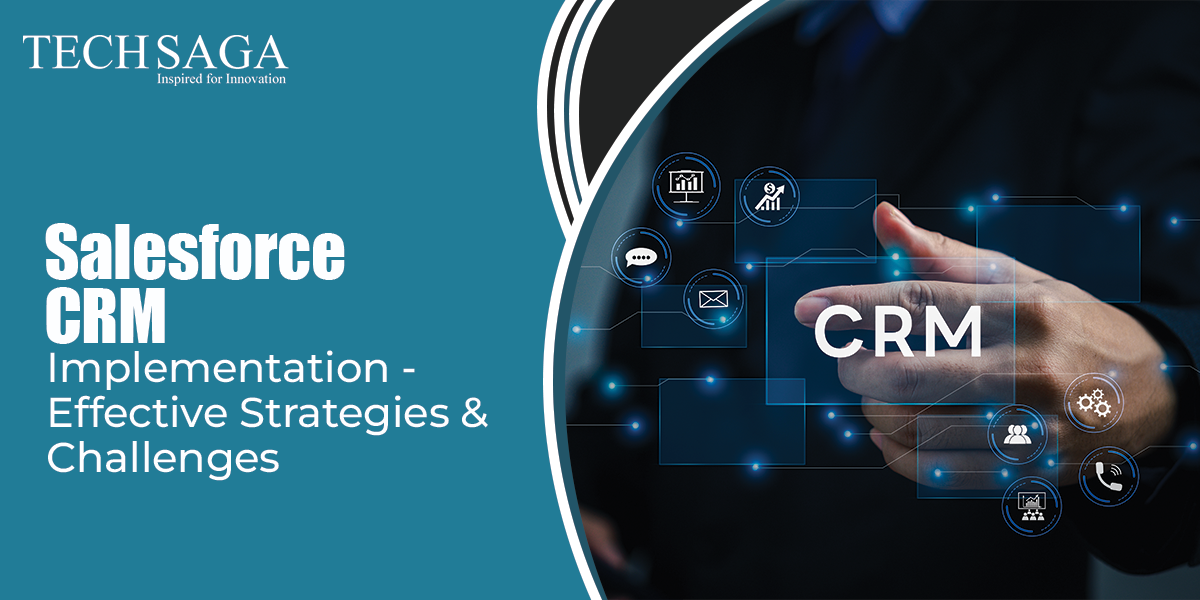Team Techsaga
Gain valuable insights and stay updated with the latest innovations through our engaging blog. Explore trends, technology advancements, and expert opinions to navigate the ever-evolving world of IT.
Salesforce Integration Solutions – A Comprehensive Guide
Today, where digital transition is driving a competitive advantage, businesses are not limited to traditional systems. Moreover, disconnected apps and fragmented data frequently hinder them. Further, as companies are adopting multiple tools for sales, marketing, finance, and operations, the demand for a unified platform is critical. Therefore, here steps in ‘ Salesforce Integrations Solutions’ as a strategic necessity. Integrating Salesforce with other enterprise systems eventually unlocks real-time insights, streamlines workflow, and enhances customer experiences for businesses. Subsequently, with the growth of remote teams, cloud-first initiatives, and AI-powered decision-making, operational efficiency now revolves around seamless integration. Moreover, as organizations globally are seeking trusted expertise, the spotlight is increasingly on Salesforce integration partners. Notably, these partners are emerging as major players. They further offer deep technical expertise and cost-effective solutions for the dynamic needs of both domestic and international markets. So, this is an in-depth guide on Salesforce Integration Solutions that will help you understand everything in detail. Have a look!
What Are Salesforce Integration Solutions?
Salesforce Integration Solutions refer to the process of connecting Salesforce CRM with other business-critical applications, services, or data sources. These integrations ensure real-time data synchronization, streamlined workflows, improved team collaboration, and better decision-making.
The goal is simple: create a seamless ecosystem where all business applications talk to each other through Salesforce.
Whether it’s integrating Salesforce with:
- ERP systems (like SAP or Oracle),
- Marketing automation platforms (like HubSpot or Mailchimp),
- Collaboration tools (like Slack or Microsoft Teams),
- E-commerce platforms (like Shopify or Magento),
So, the aim is to boost efficiency, eliminate manual data entry, and drive holistic business growth.
Why Do Businesses Need Salesforce Integration Solutions?
Here’s why companies around the world are investing in Salesforce Integration Solutions:
1. Real-Time Data Access
Having customer data updated in real-time across platforms allows teams to respond faster and with better insights.
2. Eliminates Manual Errors
Manual data migration leads to errors and inefficiencies. Also, integration automates these processes, reducing the room for mistakes.
3. Enhanced Productivity
When systems talk to each other, employees save time switching between apps, eventually allowing them to focus on value-driven tasks.
4. Customer-Centric Approach
Sales, support, and marketing teams can access unified customer profiles, consequently leading to personalized experiences and improved customer satisfaction.
5. Scalability
As your business grows, integrating new systems with Salesforce ensures your tech infrastructure evolves in sync.
Types of Salesforce Integrations
Understanding the types of Salesforce integrations helps determine the best approach for your business needs:
1. Data Integration
This allows two or more systems to share information bi-directionally or unidirectionally. It’s commonly used when syncing customer data, sales records, or product information.
Example: Integrating Salesforce with your ERP to automatically update inventory and billing information.
2. Business Logic Integration
Business logic integration allows the processes and workflows in one system to trigger actions in another.
Example: A lead generated from your website (via a third-party form) automatically creates a new opportunity in Salesforce.
3. User Interface Integration
This type presents data from multiple systems in a unified interface. It also helps users work within one platform without navigating to others.
Example: Embedding a third-party analytics dashboard directly into the Salesforce interface.
Common Tools and Methods Used in Salesforce Integration
There are several tools and methods businesses use to implement Salesforce Integration Solution:
1. Salesforce APIs
Salesforce offers a robust set of APIs like REST API, SOAP API, Bulk API, and Streaming API. So, developers can use these to build custom integrations.
2. Middleware Platforms
Middleware or iPaaS (Integration Platform as a Service) solutions act as intermediaries between Salesforce and other apps. Further, popular platforms include:
- MuleSoft (also owned by Salesforce)
- Dell Boomi
- Jitterbit
- Informatica
- Workato
Therefore, these tools simplify complex integrations and offer pre-built connectors.
3. AppExchange Integrations
Salesforce AppExchange offers thousands of pre-built apps and connectors for third-party platforms. You can also integrate platforms like QuickBooks, Mailchimp, and more without custom coding.
4. Custom Development
For highly specific use cases, organizations often rely on custom development by Salesforce integration partners to create tailored solutions.
Choosing the Right Salesforce Integration Partners
Integrating Salesforce is not a plug-and-play process. It requires careful planning, execution, and maintenance. So, this is where Salesforce partners in India and across the globe come into the picture.
What to Look for in a Salesforce Integration Partner:
- Experience & Certifications: Ensure the partner has certified Salesforce developers and architects.
- Domain Expertise: Choose someone who understands your industry’s pain points.
- Customization Capabilities: Can they build solutions tailored to your unique needs?
- Post-Implementation Support: Integration isn’t a one-time job. Look for long-term support.
- Client Reviews & Case Studies: Check real-world success stories and testimonials.
India has become a major hub for Salesforce integration solution services due to its large pool of talented developers, cost-effective solutions, and robust IT infrastructure. Many top Salesforce partners in India offer end-to-end services, including consultation, development, integration, and support.
Salesforce Integration Solutions for Key Business Functions
Let’s explore how different departments benefit from these solutions:
1. Marketing
- Integrate with email platforms for automated campaigns.
- Sync lead data from forms, ads, and social media.
- Also, use AI tools for customer segmentation and personalization.
2. Sales
- Get real-time inventory and pricing from ERP.
- Automatically assign leads to sales reps.
- Also, integrate e-signature and document management tools.
3. Customer Support
- Connect with ticketing tools like Zendesk or ServiceNow.
- Track customer queries and case resolutions in one place.
- Also, offer omnichannel support by integrating chat and voice platforms.
4. Finance & Operations
- Sync invoices, payments, and purchase orders with accounting tools.
- Integrate Salesforce with logistics software to streamline delivery workflows.
- Also, automate revenue recognition and compliance tracking.
Challenges in Salesforce Integration (and How to Overcome Them)
Integration, while beneficial, comes with challenges:
1. Data Inconsistencies
Solution: Conduct data mapping and validation during planning. Further, use middleware to handle transformation.
2. Performance Issues
Solution: Optimize API calls, batch processing, and leverage caching techniques.
3. Security Concerns
Solution: Follow Salesforce’s security guidelines. Use OAuth, secure tokens, and encryption.
4. Change Management
Solution: Train teams and involve them early in the integration process to reduce resistance.
Future of Salesforce Integration Solutions
The integration landscape is evolving fast:
- AI & Automation: Platforms like Einstein AI and Flow Automation will further reduce manual tasks.
- Hyperautomation: Combining RPA, AI, and integration to automate end-to-end workflows.
- Real-Time Integration: Streaming data integration will become standard for real-time analytics.
- API-First Architecture: Businesses are adopting microservices and APIs as a core digital strategy.
Therefore, with these changes, Salesforce Integration Solutions are not just technical necessities. Moreover, they’re strategic enablers of digital transformation.
Conclusion: Take the Next Step with the Right Integration Partner
So, whether you are a startup or an enterprise, connecting Salesforce with your existing systems can effectively scale up your operations and keep you ahead of the competition. The right Salesforce integration partners in India ensure a smooth Salesforce implementation, ongoing optimization, and future-ready architecture.
Now, if you are looking for the best Salesforce integration solutions, no need to look further than Techsaga. We deliver seamless, efficient, and customised Salesforce integrations that enhance your business operations, streamline workflows, and drive better customer engagement.




